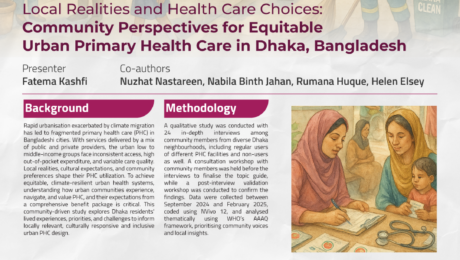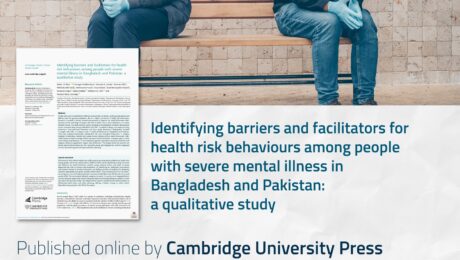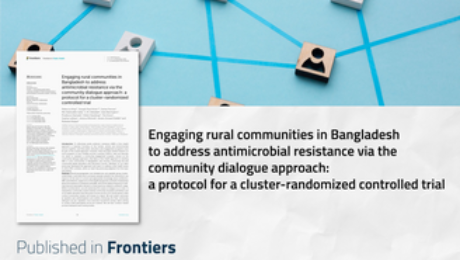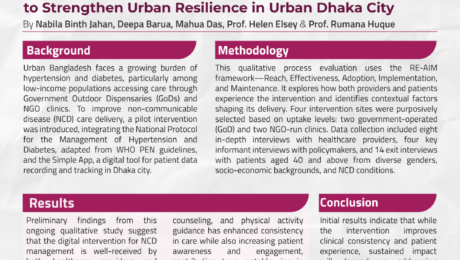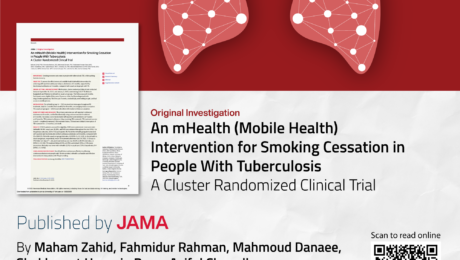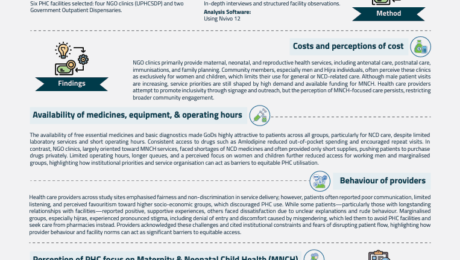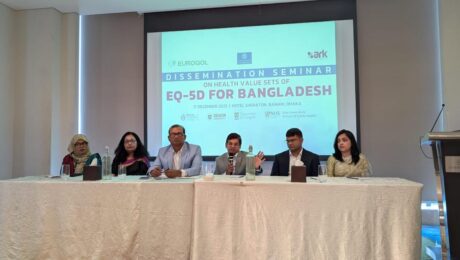Let’s lookback at the impactful contributions from ARK Foundation researchers at ICUH 2025, representing Bangladesh and bringing forward community-rooted insights that continue to inform inclusive and equitable urban health conversations worldwide. ARK Foundation participated in multiple segments at the International Conference on Urban Health (ICUH) 2025, Wellington, New Zealand. An abstract titled 𝐋𝐨𝐜𝐚𝐥 𝐑𝐞𝐚𝐥𝐢𝐭𝐢𝐞𝐬 𝐚𝐧𝐝
No Comments
Read the full article here People with severe mental illness (SMI) are at greater risk of obesity, cardiovascular disease and diabetes than the general population, due to a higher prevalence of health risk behaviours. Research is needed to inform tailored interventions to improve the health behaviours (diet, physical activity and sleep) of people with SMI
- Published in Journal Article, Resources
আসন্ন নির্বাচনে রাজনৈতিক দলগুলোর কাছে স্বাস্থ্যখাতে প্রত্যাশাআগামী ত্রয়োদশ জাতীয় সংসদ নির্বাচনকে সামনে রেখে আর্ক ফাউন্ডেশন এবং চ্যানেল ২৪ আয়োজন করেছে একটি বিশেষ আলোচনা অনুষ্ঠান। যেখানে বাংলাদেশের স্বাস্থ্যখাতের প্রত্যাশা ও চ্যালেঞ্জ নিয়ে নাগরিকদের কী মতামত তা নিয়ে সরাসরি আলোচনা করবেন দেশের শীর্ষ জনস্বাস্থ্য বিশেষজ্ঞ ও নীতিনির্ধারকগণ। তাদের আলোচনায় থাকবে দেশের স্বাস্থ্যব্যবস্থার কাঠামোগত সংস্কার, সেবার মানোন্নয়ন, জরুরি
- Published in Event, News, News and Media
Click here to read the full article Introduction: To effectively tackle antibiotic resistance (ABR) a One Health approach is required, focusing on the human, animal and environmental sectors together, and that public education and engagement programs must be part of the overall approach. However, there has been limited research on such programs in low−/middle-income countries (LMICs).
- Published in Uncategorized
Let’s lookback at the impactful contributions from ARK Foundation researchers at the International Conference on Urban Health (ICUH) 2025, representing Bangladesh and sharing insights from local urban health experiences which continue to inform inclusive and equitable urban health conversations worldwide. ARK Foundation has participated in different segments at the ICUH 2025, Wellington, New Zealand. An
Find the full article here A new research article titled ‘An mHealth (Mobile Health) Intervention for Smoking Cessation in People With Tuberculosis: A Cluster Randomized Clinical Trial’ has been published in the Journal of the American Medical Association (JAMA). The study was led by Kamran Siddiqi, Professor of Public Health at Hull York Medical School,
- Published in Journal Article, Resources
ARK Foundation organized a dissemination event on 17 December 2025 in Dhaka titled ‘EQ-5D Valuation Study for Bangladesh,’ bringing together health economists, policymakers, researchers, and development partners. EQ-5D (EuroQol 5-Dimension) is a tool that measures people’s health-related quality of life, capturing how health problems affect people’s daily activities and overall well-being. The event presented findings
- Published in Event, News, News and Media
In 2020, while the government spent Tk 2,187 crore on medicines, the public paid nearly Tk 38,000 crore out of pocket, making medicines the biggest driver of health-related financial burden. This gap highlights the urgent need to plan the health budget more strategically, based on real cost drivers. In a roundtable with The Business Standard,
- Published in News and Media, Video
Did you know that over 70% of deaths in Bangladesh are caused by non-communicable diseases (NCDs) like heart disease, diabetes, and cancer? If we don’t tackle NCDs, we can’t achieve universal health coverage. In a roundtable with The Business Standard, Prof. Dr. Syed Zakir Hossain, Line Director of the Non-Communicable Disease Control Programme, highlighted a
- Published in News and Media, Video

